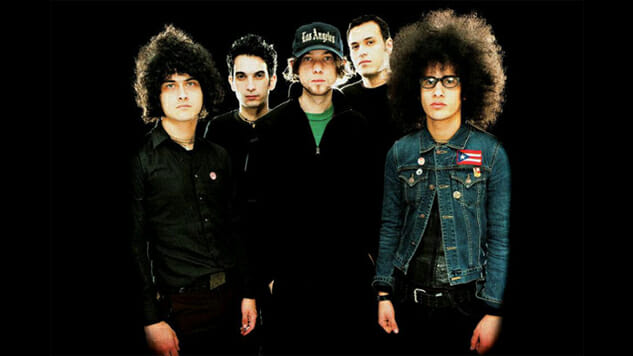The 25 Best Punk Albums of the 2000s

When you think of music from the past 16 years, “punk” isn’t typically a word used to describe the mainstream musical landscape. Indeed, as far as a great number of music lovers are concerned, music ceased to exist at exactly midnight on New Year’s Eve 1999, and punk is no exception. The ‘90s saw the success of the post-hardcore and emo genres, but ever since the turn of the millennium, punk has not been nearly as huge in the public consciousness, with many considering Green Day’s 2004 album American Idiot to be mainstream punk’s death rattle. (Conversely, others consider it a lasting tome of punk’s evolution.)
But as is the case with all genres of music, musicians are still making great punk. It just takes a little digging to find and a little broader perspective of the extents of the genre (encompassing elements of screamo, hardcore, dance, and more). Although the cutting satire and political commentary of bands such as The Clash and Dead Kennedys may not be as accessible as it was during their heydays, modern punk makes up for it in sheer passion and emotion, covering topics such as depression and loneliness with 30-minute gut punches and sweeping, epic concept albums. Here are the 25 best punk albums since 2000.
25. The Fall of Troy, Doppelgänger
One of the most quintessential post-hardcore bands of the 21st century, the Fall of Troy provides a crash course on what to expect in the genre with Doppelgänger—Harsh screaming combined with emo-influenced clean singing, sharp riffs and a song named after the star of Home Alone. The band’s technical skill shines, even by the standards of post-hardcore, often eschewing traditional song structure in the middle of a song for the sake of a long passage of instrumental freak outs akin to prog rock bands of yore. The band released two more lackluster records before breaking up in 2010 only to reunite three years later, and so far none of their follow-ups have matched up to this great primer into the world of post-hardcore.
24. Against Me!, Against Me! is Reinventing Axl Rose
Though Against Me! has been defined in recent years by frontwoman Laura Jane Grace coming out as transgender, it’s worth remembering that they remain one of the most essential bands of the folk-punk movement. Reinventing Axl Rose remains required listening with its stripped-back production and brevity. The album allows focus on the group’s blend of folk and punk, as well as Laura’s fiery and passionate vocal delivery. Lyrically, the band throws back to punk’s politically charged roots with anarchist leanings being a prominent theme, but instead of the sarcasm and irony that charged many of punk’s earliest bands, Against Me! throws itself sincerely behind the message of every track on the album. Sincerity is in very short supply nowadays, and Against Me! serves as a constant reminder as to why it is needed.
23. …And You Will Know Us By the Trail of Dead, Source Tags & Codes
Long band name aside, …AYWKUBtToD (even the acronym is too long) had been making waves throughout the Austin music scene for years prior to the release of 2002’s Source Tags & Codes. However, it’s on this release that they perfectly straddled the already thin lines between indie rock, post-hardcore and noise rock, reaching the sweet spot of commercial acceptability while not alienating the punk fanbase that got them to where they were. Unfortunately, their newfound attention was squandered by their label, who frontman Conrad Keely has gone on record stating that they mishandled the release of their follow-up, but the band still has one of the best albums to be released in the past decade and a half for at least three different genres.
22. The Gaslight Anthem, The ’59 Sound
The fusion of punk rock with the heartland rock of Bruce Springsteen is one of those things that it’s a bit surprising more bands haven’t done. Although punk is steeped in cynicism while unapologetic optimism has always been Springsteen’s forte, musically, both are based on triumphant choruses and propulsive rhythms. The Gaslight Anthem gained the support of music publications and the local punk scene with its 2007 debut Sink or Swim, but truly broke into the realm of essential punk with its follow-up The ’59 Sound. With its perfect combination of punk and narrative nostalgia, the album propelled the band toward opening gigs for Social Distortion and The Boss, himself. The band is currently on indefinite hiatus following the release of the lackluster Get Hurt in 2014 and frontman Brian Fallon released a solo record last year, but the band ever regroups, it will be to fans eagerly waiting to hear that distinctive ’59 Sound again.
21. Pg. 99, Document #8
Much like the emo genre it takes its name from, screamo gets a bad rep among rock fans, mostly thanks to years of misuse. However, screamo has actually produced some of the most cathartic music in modern punk, including one of its most essential releases, 2001’s Document #8. Despite clocking in at a mere 20 minutes on the main release, Pg. 99 effectively make the case for the fusion of emo and hardcore punk with furious guitar playing and vocals on the verge of breaking down. It may take some courage to get past the awful album cover, but once you do, you’re in for a treat.
-

-

-

-

-

-

-

-

-

-

-

-

-

-

-

-

-

-

-

-

-

-

-

-

-

-

-

-

-

-

-

-

-

-

-

-

-

-

-

-








































